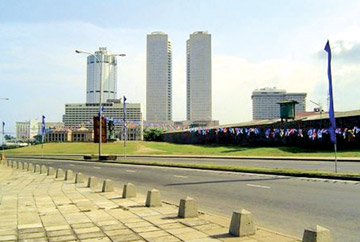|
Monetary policy review - February 2012:
Inflation declines to 3.8% in January
Inflation, as measured by the change in the Colombo Consumers’ Price
Index (CCPI, base 2006/07), continued to moderate, with year-on-year
inflation declining to 3.8 per cent in January 2012 from 4.9 per cent in
December 2011. While this is the 36th consecutive month with single
digit inflation, improvements in domestic food supplies such as most
varieties of vegetables, potatoes and big onions mainly contributed to
the continuation of low inflation, whereas non-food inflation showed an
increase during the month. Meanwhile, year-on-year core inflation in
January 2012 remained unchanged from the previous month at 4.7 per cent.

Consequent to the increased domestic economic activity, low interest
rates, as well as the unexpectedly high energy prices in the
international market, the total expenditure on imports increased
substantially to US dollars 18.4 billion during the first eleven month’s
of 2011 widening the trade deficit.
This was in spite of earnings from exports increasing by 22.2 per
cent to US dollars 9.6 billion during the period.
Increased earnings from tourism, increased workers’ remittances, and
other inflows to the services account helped cushion the impact on the
current account deficit, while the Central Bank had to intervene by
supplying foreign exchange, on a net basis, to mitigate the undue
pressure on the domestic foreign exchange market.
Despite higher inflows of foreign direct investments and inflows to
the Government, gross official reserves (excluding Asian Clearing Union
balances) declined to US dollars 5.9 billion by end December 2011,
representing the equivalent of 3.6 months of imports.
Meanwhile, credit granted by commercial banks to the private sector
increased by 34.5 per cent, year-on-year, in December 2011,
substantially exceeding projections. Provisional estimates indicate that
within the credit extended to the private sector by commercial banks,
trade related credit and credit driven by import related items such as
motor vehicles and consumer durables increased significantly. Import
related credit increased by over 34 per cent during 2011, while the
increase in credit for export activity was only around 8 per cent during
the year.
Pawning also displayed a significant increase in 2011. In addition,
credit granted to the Government and public corporations by commercial
banks increased considerably, and in particular, a higher petroleum
import bill and the inadequate adjustment to domestic petroleum prices
led to increased borrowings by the Ceylon Petroleum Corporation (CPC).
At the same time, excess liquidity in the domestic money market
declined from Rs.124 billion as at end 2010 to the current level of
around Rs 15 to 20 billion, and such decline in liquidity in the
domestic money market led to market interest rates recording an upward
movement in recent months.
With excess liquidity declining, commercial banks also competitively
raised interest rates paid on deposits, with rates on 3-month and
6-month term deposits showing a considerable increase during the past
few months.
Taking into consideration these macroeconomic developments, the
Monetary Board of the Central Bank of Sri Lanka is of the view that the
continuous increase in credit extended to the private sector by
commercial banks needs to be addressed for two main reasons: First, to
curtail import related credit, thereby reducing the trade deficit and
the current account deficit, and second,to effectively ensure that
inflation remains at the mid-single digit levels in the second half of
2012 as well, notwithstanding the sharp build up of credit in 2011.
Accordingly, the Monetary Board, at its meeting held on 2nd February
2012, decided to increase both the Repurchase rate and the Reverse
Repurchase rate of the Central Bank by 50 basis points each.
Hence, the Repurchase rate and the Reverse Repurchase rate of the
Central Bank will be 7.50 per cent and 9.00 per cent, respectively. The
Monetary Board also decided to direct commercial banks to moderate their
credit disbursements so that the overall credit growth in 2012 will not
exceed 18 per cent of their respective loan book outstanding at the end
of 2011, while credit growth of up to 23 per cent will be allowed for
those banks, which finance the excess up to 5 per cent of the credit
growth, from funds mobilised from overseas.
In addition, the Central Bank will monitor on a regular basis, the
targets for inflows as set out in the ‘Road Map: Monetary and Financial
Sector Policies for 2012 and beyond’, with regard to foreign direct
investments (FDI), earnings from tourism, workers’ remittances, Tier 2
capital of banks, inflows to the stock market, inflows to the government
securities market, and a credit line for petroleum imports, which would
help increase net foreign exchange inflows to the country, thereby
enabling the balance of payments to record a healthy surplus in 2012.
The Monetary Board is of the view that these adjustments to the
monetary policy stance of the Central Bank, as well as other measures
that may be adopted by relevant Government authorities would materially
reduce the need for the Central Bank to supply foreign exchange to the
market, on a net basis, during 2012.
The date for the release of the next regular statement on monetary
policy will be announced in due course. |



